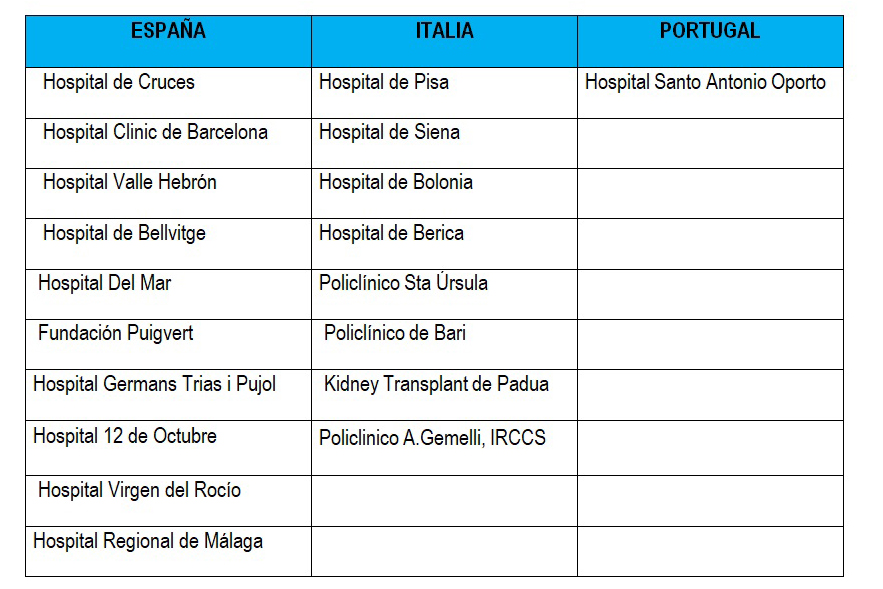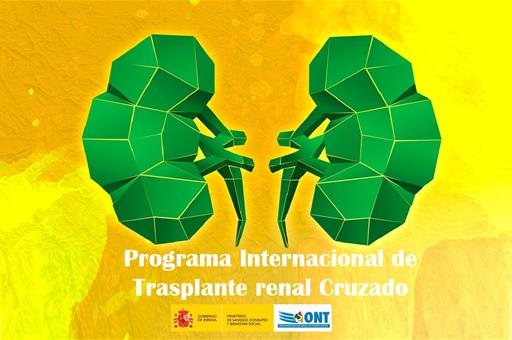Providing its experience and overseeing the programme, the ONT coordinated the operation
Spain and Italy perform second international cross-over kidney transplant in southern Europe
News - 2019.11.6
The donors and recipients are in perfect health and have been discharged from hospital. The Spanish pairing consisted of a mother and son, while the Italian pairing consisted of a married couple.
Both the kidney extractions and the transplants were performed on the same day - 22 October - at the Puigvert Foundation in Barcelona, a benchmark centre in kidney transplantation, and the Padova Kidney Transplant centre in Italy.
The cross-over kidney transplant programme is based on the exchange of live kidney donors between two or more couples. Its goal is to offer patients with chronic renal failure the chance to receive an organ from a living donor, even when the partner or family member wishing to make the donation is incompatible.
This type of transplant involves a complicated logistics process that required full cooperation between the central offices of the Spanish and Italian national transplant organisations, the autonomous and/or regional transplant coordinators (the Catalan Transplant Organisation (Spanish acronym: OCATT) in Spain) and the medical teams at the two hospitals taking part in this operation. The medical team at the Puigvert Foundation consisted of Dr. Alberto Breda, head of the kidney transplant surgery team, Dr. Luis Guirado, head of the nephrology service, Dr. Carme Facundo, nephrology service assistant, and Dr. Joan Palou, director of the urology service.
18 hospitals were involved in the second successful cross-over under the international cross-over kidney transplant programme (10 Spanish, 7 Italian, 1 Portuguese (see attached table)), as well as 129 donor-recipient couples (81 Spanish, 27 Italian and 21 Portuguese).
The cross-over kidney transplant programme is one of the living-donor kidney transplantation methods that the Spanish National Transplant Organisation launched in Spain 10 years ago after developing a joint work protocol in partnership with a multi-disciplinary working group. The first cross-over kidney transplant in Spain was performed in July 2009. Since then, a total of 228 such transplants have been performed in Spain under the national programme, a figure that rises to 230 when including the two performed under the international programme.
Cross-over kidney transplantation is a highly developed form of treatment in certain countries with a high living-donor kidney transplantation rate. This is the case in Australia, Canada, South Korea, the United States, the Netherlands and the United Kingdom, where this type of operation has been performed with excellent results for some time now.
The use of increasingly less invasive surgical techniques and the study and care of donors (before, during and after the operation) have enabled this type of transplant to become more common, given that the possible complications for the donor have been reduced considerably and kidney extraction from live donors is now considered a low-risk procedure.
Register of donor-recipient couples
It was Spain that, via the Spanish National Transplant Organisation, promoted the creation of the International Cross-over Kidney Transplant Programme between the countries that make up the South Transplant Alliance (Spain, France, Italy, Portugal, Czech Republic and Switzerland). Both the first and the second successful cross-overs involved Spain, Italy and Portugal.
A fundamental aspect of this programme is the Register of Donor-Recipient Pairings, which needs a computer application to calculate the cross-overs and swiftly produce the results.
The programme must be supervised by the manager of the national cross-over donation programmes in each participating country: in this case, Italy, Portugal and Spain.
The goal sought by internationalising cross-over kidney transplantation is to increase the chances for pairings to find a compatible donor and enable the exchange of organs between donors. The more pairings that take part in the programme and the greater their genetic heterogeneity, the bigger the chance is of effectively performing the donation and kidney exchange.
Other countries in northern and central Europe are working in the same direction.
The Spanish National Transplant Organisation is coordinating the process
The Spanish National Transplant Organisation, which coordinated this operation at all stages of the process, provided its experience and the computer platform that enables analysis of the exchange possibilities between the pairings on the International Register.
The Spanish National Transplant Organisation is also responsible for managing the cross-over of pairings, duly informing the participating countries about the possible combinations identified after each cross-over and drawing up an annual report on the results. To achieve this goal, a secure web platform was created based on the software used for the ONT cross-over kidney donation programme, which contains information about all the donor-recipient pairings. This platform is located at the ONT and its staff are responsible for its maintenance and administration.
Participating hospitals by country
 Ministerio de Sanidad, Consumo y Bienestar Social
Ministerio de Sanidad, Consumo y Bienestar Social
Non official translation





